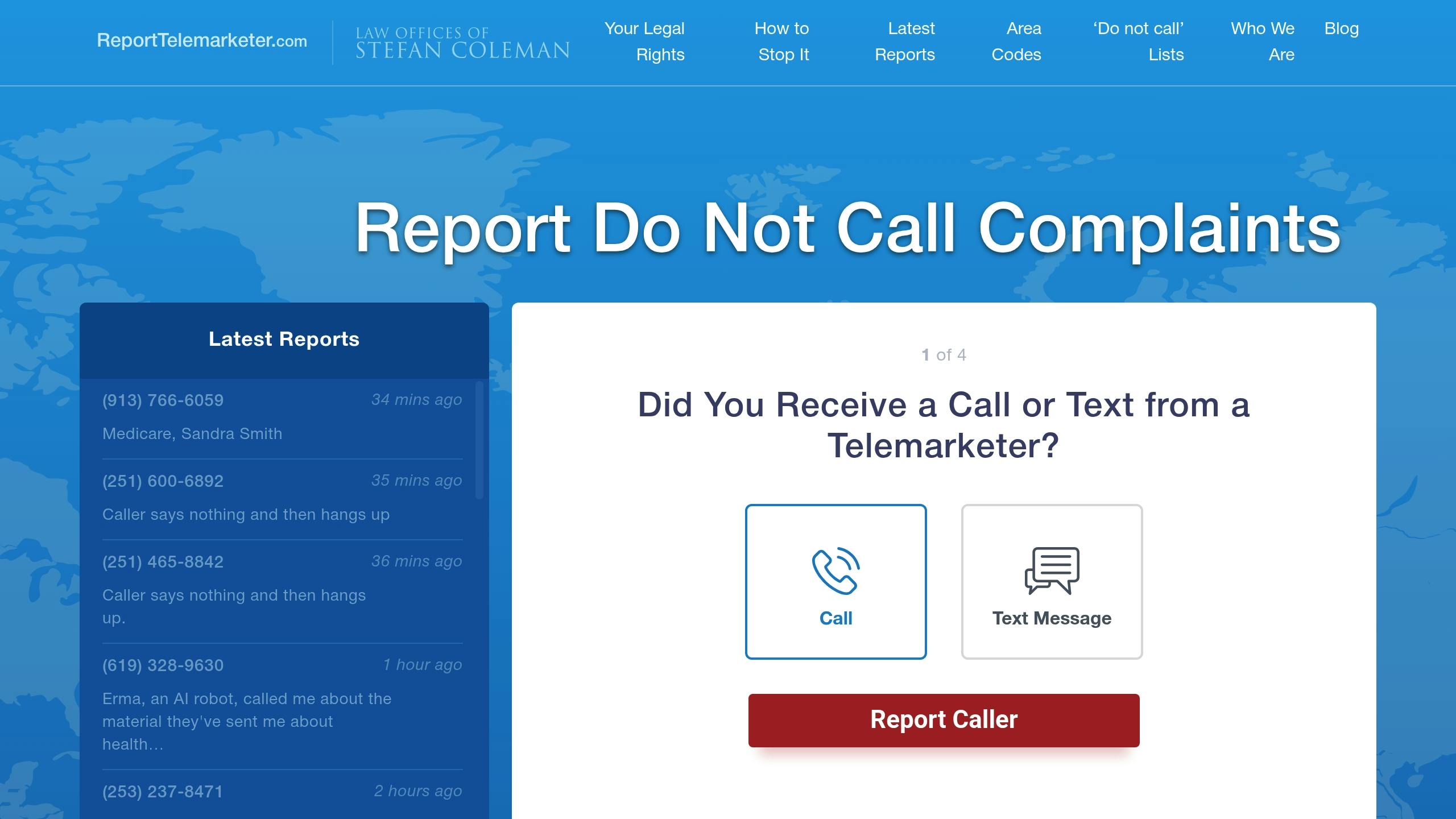
Want to stop telemarketers and get paid for their violations? The Telephone Consumer Protection Act (TCPA) allows you to claim up to $1,500 per call or text for illegal telemarketing practices. This guide will help you:
- Spot violations like robocalls, texts without consent, or calls to Do Not Call (DNC) numbers.
- Gather evidence such as call logs, text screenshots, and opt-out requests.
- File complaints with the FCC, FTC, or your state Attorney General.
- Work with TCPA lawyers to maximize your compensation.
- Prevent future violations and claim penalties for willful breaches.
TCPA violations include robocalls, unsolicited texts, and ignored opt-out requests. If you act quickly and document thoroughly, you could receive significant compensation for each violation. Let’s break it down step-by-step.
Complete guide to sue telemarketers: $1500 per violation
Step 1: Spot TCPA Violations
Identifying TCPA violations early is crucial. Recent cases highlight the steep penalties involved – Capital One faced a $75.5 million settlement, while Dish Network was hit with a $341 million fine for violations .
Types of TCPA Violations
Understanding the common types of TCPA violations can help you recognize potential issues:
| Violation Type | Description | Recent Example |
|---|---|---|
| Automated Calls/Texts | Using autodialers without prior consent | Highmark Health Options paid $1.85M for unauthorized calls |
| Robocall Messages | Sending pre-recorded voice messages | Kenneth Moser fined $10M for illegal robocalls |
| Do Not Call Violations | Contacting numbers on the Do-Not-Call Registry | Gerber Life Insurance sued for DNC list violations |
| Opt-out Violations | Ignoring "stop" requests | Gopuff faced a lawsuit for texts after opt-out requests |
| Time Violations | Calling outside 8 a.m. to 9 p.m. local time | MedMen paid $5M for improper text messaging |
"The TCPA allows people to get money for unsolicited calls and texts. TCPA class action lawsuits allow consumers to sue for robocalls, or robotexts, to collect between $500 and $1,500 per call or text."
These categories provide a framework for assessing the strength of a potential claim.
Check If You Have a Claim
To determine if you have a valid TCPA claim, review the following:
- Did you provide written consent for the communication?
- Were calls made outside the allowed hours (8 a.m. to 9 p.m. local time)?
- Is your number listed on the Do Not Call Registry?
- Was there any caller ID manipulation or spoofing?
In April 2023, a Florida court approved a $40 million settlement against a real estate company for TCPA violations .
"A TCPA violation occurs when a business calls unsolicited numbers, uses automated messages, or employs a robodialer to send thousands of pre-recorded messages."
Keep detailed records of each violation. If the violation is deemed willful, you could receive up to $1,500 per instance . Additionally, under the TRACED Act, businesses may face FCC penalties of up to $10,000 per unauthorized call .
Step 2: Record All Evidence
Why Keep Records
Keeping accurate evidence is crucial for supporting your TCPA claim. For instance, in Beal v. Outfield Brew House, the defense was weakened because consent records were shredded . Proper documentation can reveal patterns of violations, show opt-out attempts, and demonstrate the extent of damages. Below, you’ll find the key records you should gather to strengthen your case.
What Records to Keep
| Record Type | Details | Format |
|---|---|---|
| Phone Calls | Date, time, duration, caller ID | Screenshots, call logs |
| Text Messages | Full message content, sender number, timestamp | Screenshots with visible date/time |
| Voicemails | Complete recording, caller information | Audio files, transcripts |
| Opt-out Attempts | Your "STOP" replies, unsubscribe requests | Screenshots, email confirmations |
| Company Information | Business name, representative details | Written notes, website captures |
Tips for Documentation: Always preserve original records and keep them organized in chronological order. Use screenshots to provide context, and make sure to securely back up all digital evidence .
sbb-itb-a8d93e1
Step 3: Submit Your Claim
Once you’ve gathered evidence of violations, it’s time to file your claim.
File with Federal Agencies
Federal agencies like the Federal Communications Commission (FCC) and the Federal Trade Commission (FTC) handle complaints related to TCPA violations. Here’s what you need to know about filing with them:
| Agency | Filing Method | What You’ll Need |
|---|---|---|
| FCC | FCC Consumer Complaint Portal | Call logs, text screenshots, and proof of unwanted contacts |
| FTC | FTC Complaint Portal | Company details, a timeline of violations, and supporting evidence |
| State AG | State-specific portal (check your state’s referral table) | Business information and documented violations |
Both the telemarketing company and any third-party service providers they used can be held accountable for the unwanted contacts . After filing with federal agencies, reach out to your state Attorney General for additional support.
Contact Your State AG
Your state Attorney General’s office plays an important role in enforcing TCPA protections through consumer protection laws . Here’s how they can assist:
- Investigate violations and mediate disputes
- Enforce both state and federal consumer protection laws
- Help resolve issues through mediation
Keep in mind, the Attorney General’s office cannot provide legal advice . However, their involvement can strengthen your case. Use your state’s referral table to ensure you’re submitting your claim correctly.
Filing with both federal agencies and your state AG creates a stronger case and improves your chances of a positive resolution.
Step 4: Get Legal Help
Dealing with robocalls can be overwhelming, but legal professionals can help you pursue compensation under the Telephone Consumer Protection Act (TCPA). Their expertise connects your evidence to a strong claim.
Work with TCPA Lawyers
TCPA lawyers are skilled at securing compensation for violations. Here’s how they can help:
| Benefit | Details | Potential Compensation |
|---|---|---|
| Claim Per Violation | Each call or text counts | $500 per violation |
| Prove Willful Acts | Intentional breaches | Up to $1,500 per violation |
| Avoid Upfront Costs | Contingency-based fees | Pay only if you win |
| Recover Legal Fees | Fees paid by violators | Telemarketer covers costs |
"We will assert your rights under the Telephone Consumer Protection Act to the fullest extent to maximize compensation for what you have been put through."
– Law Offices of Todd M. Friedman
When choosing a TCPA attorney, prioritize those who:
- Focus specifically on TCPA cases
- Provide free consultations
- Work on a contingency basis
- Have a history of successful settlements
ReportTelemarketer.com

For extra support, you can turn to services like ReportTelemarketer.com, which are designed to help consumers enforce their rights.
ReportTelemarketer.com offers:
- Investigation of violations
- Cease-and-desist letters
- Filing formal complaints
- Recovering legal fees from violators
This service handles everything from documenting violations to resolving claims, ensuring that pursuing your TCPA rights is both effective and risk-free. Attorney fees are often recovered directly from telemarketers, so you don’t have to worry about upfront costs.
Step 5: Get Maximum Payment
If you have solid evidence, you can take steps to secure the highest possible compensation under TCPA. For deliberate violations, you could receive up to $1,500 per incident, which is three times the standard $500 payout.
Prove Deliberate Violations
To claim higher compensation, you need to show clear proof of intentional non-compliance. Here’s the kind of evidence you should gather:
| Evidence Type | Impact on Compensation | Required Documentation |
|---|---|---|
| Repeated Calls | Up to $1,500 per violation | Record timestamps and call frequency |
| DNC List Violations | May add to damages | Proof of DNC registry enrollment |
| Automated Dialers | Increases liability | Save robocall recordings |
| Consent Records | Proves lack of consent | Opt-out requests, written communication |
Keep all call logs, opt-out requests, and proof of DNC registration organized. Once you’ve documented past violations, turn your attention to stopping future ones.
Stop Future Violations
Taking steps to prevent future violations not only strengthens your case but also discourages further breaches. Under the Pallone-Thune TRACED Act, the FCC can impose fines of up to $10,000 per call for intentional violations .
Here’s what you can do to protect yourself:
-
Request Court Injunctions
File for a court order to stop further contact. This can also increase penalties for any future violations. -
Document Actual Damages
Track any harm caused, like lost work time, phone charges, or emotional distress. -
Combine Multiple Violations
If there are multiple infractions, such as repeated DNC registry breaches, you could claim damages of up to $3,000 per call .
"The TCPA allows you to seek an injunction (a court order for them to stop the illegal activity), and also for actual or statutory damages, whichever is greater."
– Jared Hartman, Esq.
Conclusion: Next Steps
Don’t wait too long – TCPA claims must be filed within four years of each violation’s date . Here’s how to strengthen your case and maximize your chances of compensation:
- Save all records: Keep call logs, voicemails, and text messages as evidence.
- File complaints: Report violations to the FCC and FTC.
- Seek legal advice: Have a lawyer review your evidence for a solid case.
- File on time: Ensure you act before the four-year deadline.
These actions will help you stay on track and build a strong approach to handling TCPA violations.
TCPA violations happen when businesses break telemarketing laws, like making unsolicited calls, using robocalls, or sending automated messages without consent.
Platforms like ReportTelemarketer.com can help you document and track violations for free, making it easier to organize your case and support your claim.
Taking action now ensures you have the evidence and tools needed to pursue fair compensation under the TCPA.